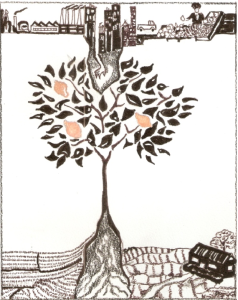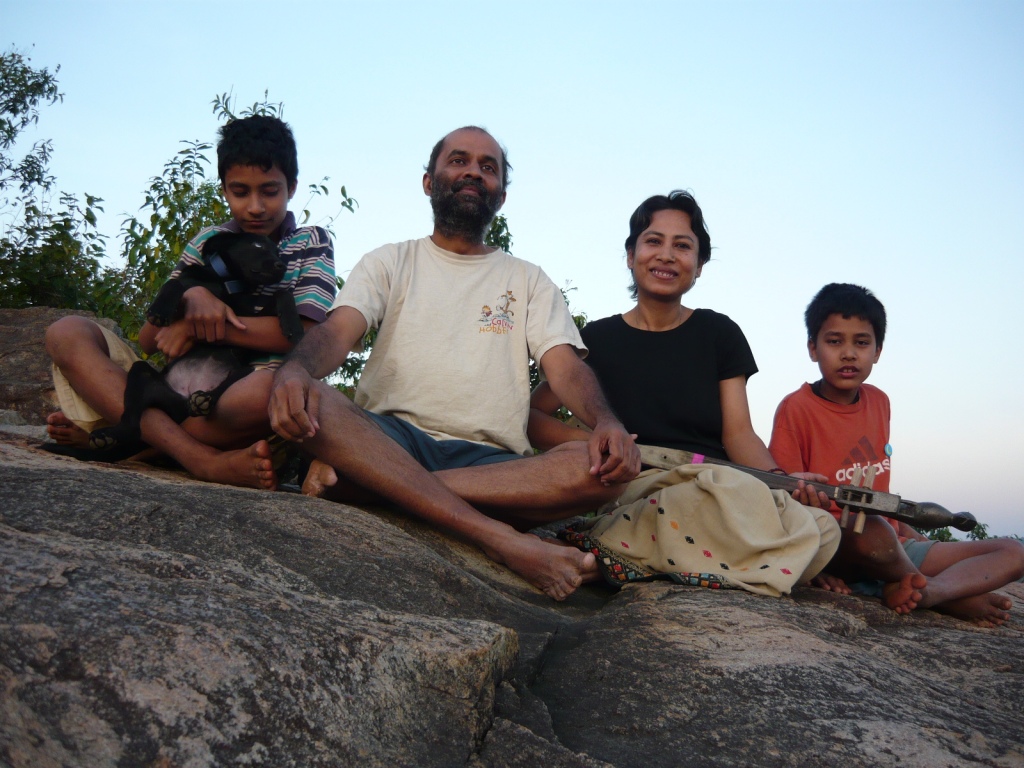Sunder was a regular IIT-ian Joe, working in TBL/TUL/T-whatever, post his delayed graduation from IIT-B in Elec. The first life-changing experience occurred when Mots returned from the US, made him quit his coolie job, and whisked him away to Rishi Valley. He lasted just about two terms, but it transformed his already skewed world-view. His next stop was Sumavanam, a year of teaching and solitude, and then Blue Mountain School Ooty, which featured the second LCE in the form of Sonati, an exiled princess from Bodo-land.
They married and settled in Geddai, a coffee-estate in the Nilgiris, where they assisted in running a make-shift break-away school. Soon after Badri was born, the school fell apart (SV has a certain talent for detonating schools — I’ll hand him that). So they were again adrift, finally settling in Thekambattu, near enough to Salem (where SVs folk’s had retired). Varun followed, and the two boys grew up on the land. So it went.
Jogesh Motwani
The title credit for this post goes to Pankaj, who has made a great film Apna Aloo Bazaar Becha. The rant credits go to me and the insight credits to Sonati. Yesterday, it came viscerally home to Sonati and me that the Economy Rules OK!
We have always sympathised with our farmer neighbours about their being trapped in the brokers’ clutches. One memory that stays is Govindraj and his young machan (brother-in-law), barely bigger than Badri Baba at that time, some 12 years ago: he was hawking tomatoes door-to-door at Rs 3 a kg; the retail price in Karumandurai was Rs15; and he said that he was not going to get more than Rs 1 a kg in Karumandurai. So he spent about three hours a day carrying his day’s pickings around the villages for some six or seven weeks!
Farmers need every encouragement to grow food, not cash.
I remember Unnamalai from Gundiyapattu pleading with a broker to give her 5 paise per lemon more than he was willing to give: eventually she had to take the offer of Rs 20 for 100 lemons.
Yesterday, I sold lemons for a rupee a piece, and I suspect I got a “good rate” because the broker was Jothi, my vegetable-wallah. Just last week I had heard him say that there was no way he could charge less than Rs 5 a lemon because he was buying them for Rs 4.
Till this year we have never sold lemons: we have pickled them, gifted plenty (once even carting a couple of hundred to Bombay to gift away: half my luggage), and generally made merry with nimbu pani, lemon cakes and what-not. This year, too, we have gifted lots: it was a real pleasure to see the usually zombie-like Easparan’s face beam when, just as he was diffidently asking me for a few lemons (“My wife told me to ask you”), Sonati emerged with a bagful!
And of course we have received gifts aplenty throughout our stay here of a variety of things. Pumpkins, coconuts, rice, what-have-you. In fact all these lemons are from trees grown from seed of lemons gifted to us by “Lemon” Annamalai.
But this year it became a problem of plenty. Brokers started accosting me with offers of 50 paise per lemon (just imagine, saar: Rs 50 for 100). They would of course strip the trees if we let them and then we, who haven’t bought a lemon for many years, may have been reduced to even that! A certain sense of entitlement also crept into those who received our lemons: “Anyway, if they are free, why not ask for more?”
The long and the short of it was that there were a bit too many to handle.So yesterday, when I was going shopping, I carried 100 lemons and asked Jothi if he wanted them for his shop. He enthusiastically took them and after having made out my vegetable bill, he finessed any attempt at bargaining (which in any case I never indulge in with him) by saying, “It’s OK Anna, the lemons have paid your bill”.
And it came home to me that I had sold our lemons at Rs1 apiece. Which was quite appalling.
(An aside: Amma in Salem says that the shop makes more out of her coconuts than she does; Aseem says that Penguin makes more out of his book than he does; Russell says that an agent would make more out of his paintings than he does; only he doesn’t use an agent; and hence makes less money than he would otherwise. But I digress.)
And this is the trap that the farmer falls into. More so, if it is a cash crop. I mean, I can gift lemons away almost indefinitely, but any takers for sugarcane? tapioca? The system ensures that the buyer calls the shots and the seller has no choice but not to grow tapioca for the market.
But that too is a phantom choice. If you grow ragi for a few years in fields surrounded by tapioca, you will find that all the neighbours’ rats migrate to your ragi field. And to add insult to injury, when you do finally harvest whatever ragi the rats have spared, your neighbours will say, “Saar, your rats have come to our fields”. Been there, done that.
The countryside is no longer a place to come home to; it is a place to leave. That needs to be turned around.
We have seen the landscape change in front of our eyes, literally. When we came here 14 years ago, 80% of the rain-fed fields we saw were food crops: ragi, samai, kambu, nellu.
Now no one grows rain-fed food crops. Farmers have moved to the cultivation of tapioca to the exclusion of virtually everything else.
The upshot is that since the aim is to make money, all our neighbours’ kids have turned to some form of brokering to add to their income. If you look at the statistics, India’s pulse production is steadily declining. Not surprising at all. Anything which requires care throughout the year is given up for low-maintenance tapioca. The menfolk can then go earn money in Tiruppur, Coimbatore, Kerala (or of course for the gamblers, there is Red-Sanders smuggling in Andhra).
I can say that here in Thekambattu, at any rate, most of the younger generation have stopped thinking like farmers. And who can blame them? And it is likely that “No longer farmers in the mind” is the rule rather than the exception all over the country. And if we lose our farmers, who will feed us?
I will end this section with a quote from Oliver Goldsmith’s Deserted Village:
“Ill fares the land, to hastening ills a prey,
Where wealth accumulates, and men decay;
Princes and lords may flourish or may fade;
A breath can make them as a breath has made.
But a bold peasantry, their country’s pride,
When once destroyed, can never be supplied.”
…and an invitation to drop in for some nimbu paani.
Apna Nimbu: Kahaan Pahunchega?
Since there has been a lot of back and forth about our lemons, on Facebook, on our blog and in e-mails to us, we thought we should clarify/consolidate, and carry on the conversation.
If a solution was required to our personal lemon problem, then e-commerce or organic marmalade would have provided one. Even so, we strongly feel that surely these lemons should be consumed locally, by our neighbours and others from nearby who need lemons to pickle or juice or…
But the problem is not a personal one but rather a systemic one: which is that primary producers of all hues seem to be trapped by a broker mafia into becoming sweat shops for faraway customers who outsource their every requirement (and responsibility).
So perhaps I need to say, with Wendell Berry, “All you who eat; eat thoughtfully”. Eating is a political act. Where you get your food, where it is cooked and who cooks it, and how you eat it: all of this contributes to the solution.
Farmers need every encouragement to grow food, not cash. As things stand, what Wendell Berry writes about 60’s America is true for India now: If you can get into a profession; why, then you must not be a farmer. If you can move to the city, why then you must leave the country. If you can work the “miracle” of industrial progress, then you must do so, even if it means the theft of energy from posterity. (Posterity can’t complain!)
The countryside is no longer a place to come home to; it is a place to leave. That needs to be turned around.

1 comment
Good article highlighting the problem of brokers.
I live in Chennai. Is there any way to buy directly from Farmers. Please let me know.Please let me know on my email address abhays.baheti@gmail.com